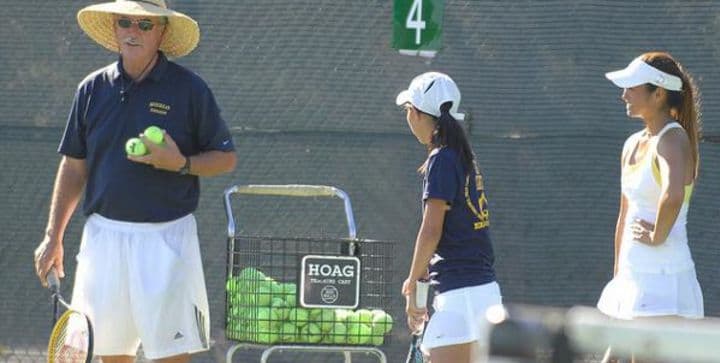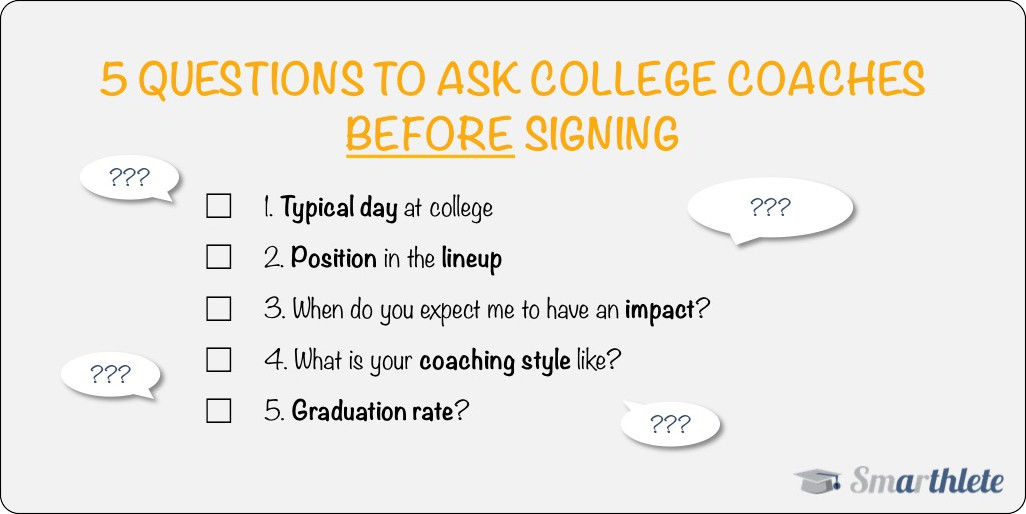5 Questions to Ask College Tennis Coaches Before Signing

When you're searching for an athletic scholarship at college, you would typically be looking to stay for the entire undergraduate program ... provided you're pleased with life at college. As a student-athlete much of your happiness will derive from your team, and who's the "designer" of the team and team spirit after all? The coach: recruiting you, deciding on your playing time, and your daily practice routine. Trust us, that's reason enough to take a look at the top 5 questions to ask college coaches before committing.

1. What does a typical day look like for your athletes?
The college will be your new home. The tennis team your new family. For the great majority of students that means moving to a different city, state, or even country (if you are an International). Whether you stay for the entire period of time (4-year undergraduate program) or less, you want to make sure you know what you're going to be be doing most of your time.
Yes, you will be spending quite some time in class and long hours in front of your laptop writing essays, but how much time will you spend on the court? In the gym? How much time will you spend travelling to dual matches or tournaments? These questions, only coaches can answer best.
Check out how we experienced a typical day at college and college life in general here.
2. Where do you see me in the lineup?
6 single spots and 6 double spots on each team, and you will naturally want to know where the coaches plan to place you in the lineup. Would you be the team's #1 player or somewhere in the middle of the lineup? Or would you be one of the players having to fight hard to maintain the #6 position, in case of strong #7 and #8 substitutes? As you talk scholarships with the coaches you'll often get a hunch. If coaches see you somewhere higher up, this generally means a chance for more scholarship money. But it's also important to get an understanding of their plans for another key question:
3. When do you expect me to have an impact on your team's success?
Coaches can sign you to start in the fall season (August/September). But coaches can also sign you for the spring season, meaning you'll enrol and join your new team in January. The major difference is that - with tennis being a spring sport - you have little time before the playing season really kicks off. Some athletes are great at adapting quickly to new settings, whereas others need a little longer. You could feel overwhelmed by schoolwork, a new language, or simply the different lifestyle at college. But you could also feel that weather conditions and court conditions require getting used to. Some coaches may sign you, hoping you'll win 18 out of 20 matches in your freshman year, whereas others are prepared to give you some time to develop and then have a major impact starting in your sophomore year.
Another good advice is "to be aware of the fact that they are looking for potential". Not just what you bring to the table right now, but in the years to come. Here's an article about just that: "3 Reasons Why Potential Matters to College Tennis Coaches"
4. What is your coaching style like?
With 1,194 schools sponsoring tennis (in 2015), there are a hundred different coaches and thus a hundred different coaching styles. You might come across types who prefer the hierarchical, military style leadership. And you could come across coaches, who like the inclusive, consensus-based approach. Both are legitimate, but chances are you're more used to either of these two extremes. Look back and think about the coaches who you've worked with. What were they like? Did you enjoy their leadership style or not? You definitely want to find out as much as possible about the college coaches you talk to when it comes to their way of coaching the team.
5. What is your graduation rate?
The only academic question in the Top 5 will help you identify 2 things:
- Does the coach also care about you excelling academically or are you mainly considered an athlete?
- How great is the coach at retaining his/her recruits?
While a low graduation rate can be directly attributed to coaches' shortcomings as a team leader, it can equally much be related to more generic shortcomings: the college itself, the study program, or the location of this particular school. A high graduation rate however signals:
"That's a good tennis program at a school where all former tennis players seem to have had a fabulous time after the coach had done a great recruiting job."
What gets you going?
Before talking to coaches about the above topics, it's key to ask yourself:
"What gets me going and what is it I'm looking for?"
You can basically ask yourself the same 5 questions, answer them, and you know pretty spot-on what it is you're looking for once you engage in talks with coaches. Are you looking to get a scholarship because you love the game? Because you want to turn pro afterwards? Or simply to pay your tuition fees, room and board, and books? Understanding yourself and your expectations will make it tons easier for you to provide coaches with a trustworthy picture of you as a potential recruit.
Your goal is to find a great match with a coach (a good scholarship offer), and some sort of certainty that coaches care a great deal about you joining their program. Read more about this in one of our previous articles. Manage expectations by understanding exactly what it is the coach is looking for. By maintaining an honest approach, you reflect who you really are and coaches can sign you for exactly that reason. By doing so, you might miss out on some scholarship offers. But don't worry; they would have never made you happy anyway. Instead, you give yourself a much greater chance of finding the perfect college tennis program; something it all comes down to in the end.
Sign-up with a free account right away here on Smarthlete and connect with college coaches right away!
(This article was originally published in February 2015, modified and republished in May 2017.)